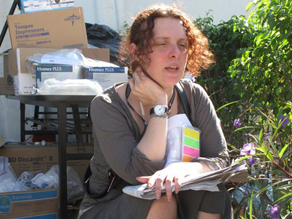Tomorrow Stef and a medical team fly out at the crack of dawn, hopefully for Port-Au-Prince, but if need be, Santo Domingo.
Meanwhile, another heart-breaker from one of the few medical teams on the ground:
January 17, 2010
Makeshift Haiti hospital
Posted: 11:17 AM ET
By John Bonifield
CNN Medical Producer
CNN Medical Producer
For a while they were throwing limbs of the dead in the trash. A human foot and arm mixed amongst the garbage. If there was ever any semblance of dignity here at this makeshift hospital on the United Nations compound near the airport in Port-au-Prince, it is quickly vanishing.

Dr. Jennifer Furin
I just watched aid workers remove a dead body from a warehouse tent that is being used to triage survivors from the earthquake. This was the forth person to die since midnight, and right now it’s only 9am.
“I have no morgue. I have no place to put dead bodies,” says Dr. Jennifer Furin, a physician from Harvard Medical School who is coordinating care in one of two hospital tents here.
“This is becoming the killing field,” she says.
The injuries I am seeing here could be managed in the United States. But here in Haiti they’re starting to kill. Some people are dying from overwhelming infection. Others from a chemical reaction in their bodies called rhabdomyolysis. When a wall or chunk of concrete falls on a person, their muscles are crushed and the body releases an enzyme that poisons the kidneys. If the injured limb is not amputated or surgically cleaned out they die.
Doctors here have been using IV fluids to protect patients from kidney failure, but they haven’t had any anesthesia to perform surgeries until today.
“This is the beginning,” says Dr. Furin. “We missed our window. Maybe not for all of them, but for many of them.”
Dr. Furin refuses to let her hospital tent become any more undignified than the situation here is making it. She’s ordered all of the doctors working in it not to dispose of any more dead limbs in the trash. Instead, she’s found a plastic bin that she's placed next to her, where the remains will go until they can be properly buried.




